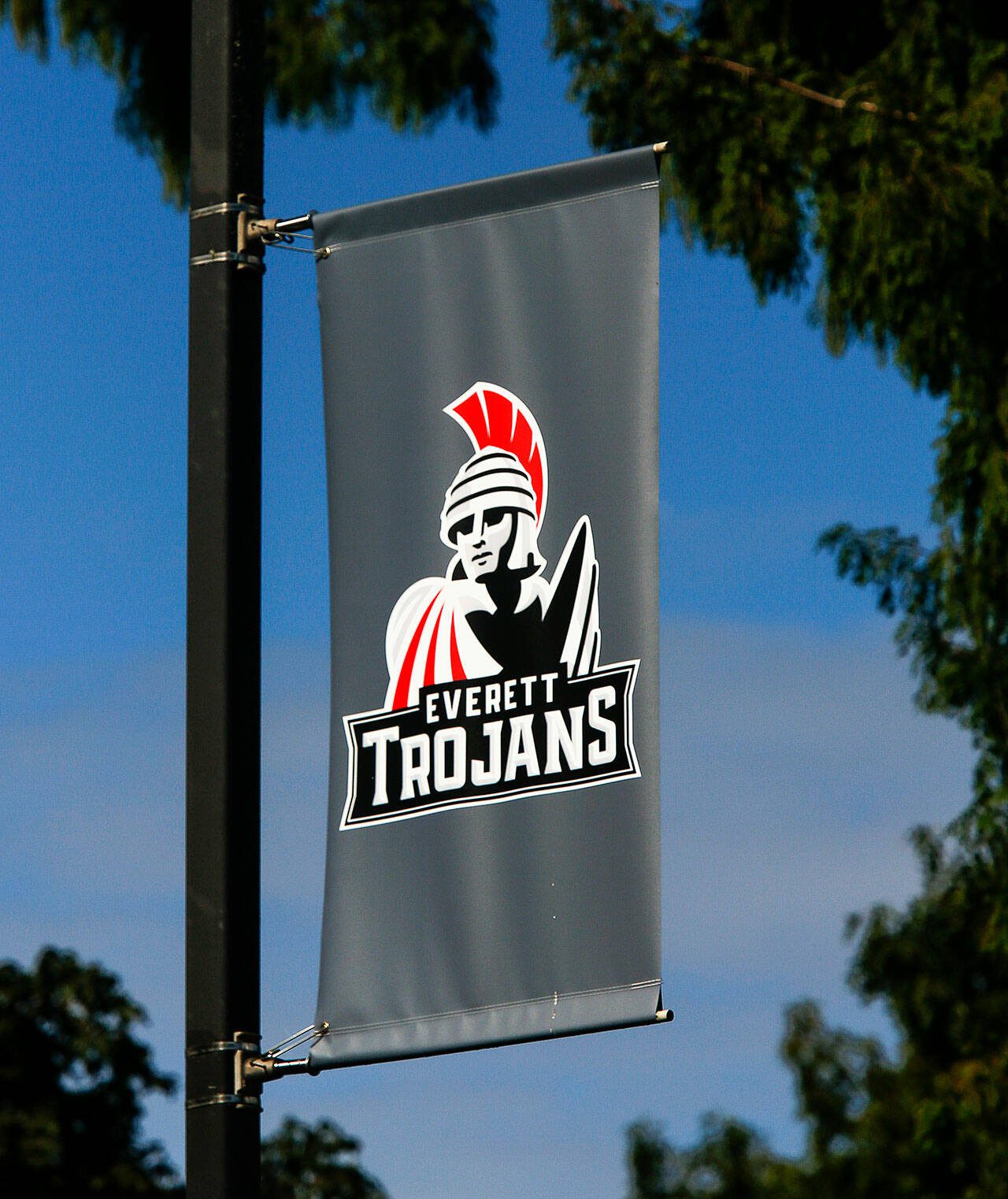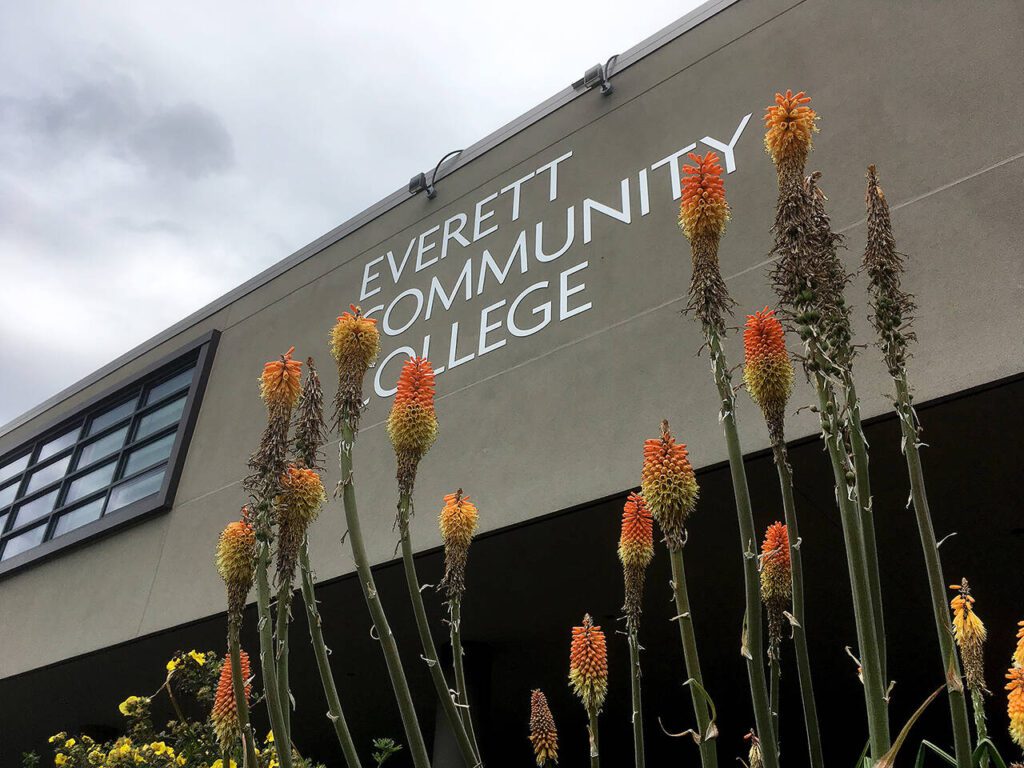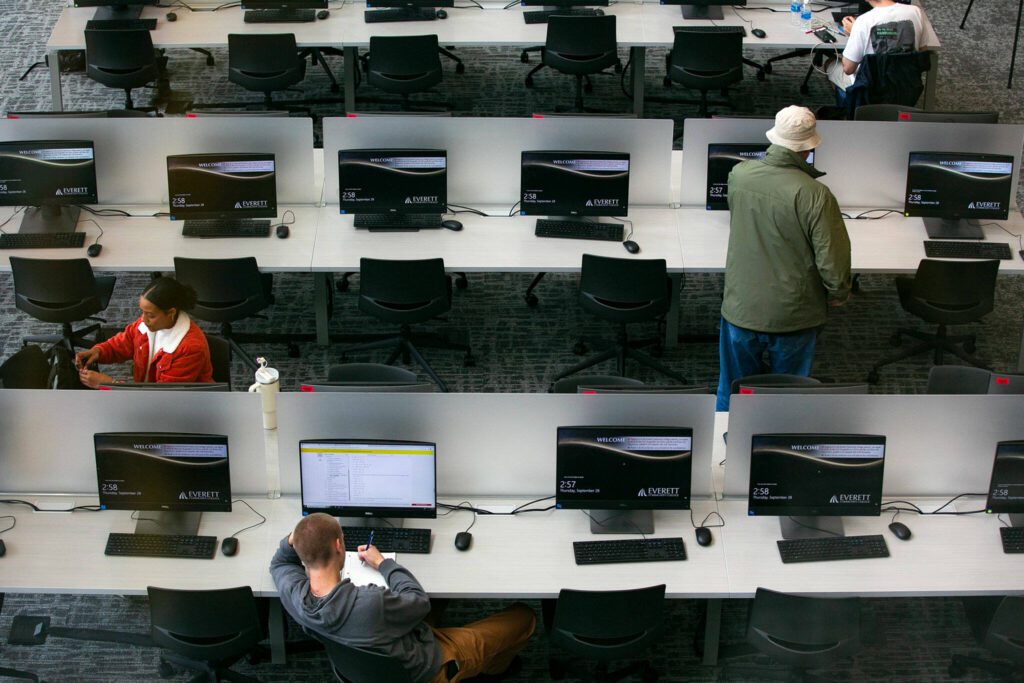EVERETT — Cora Booth could not have made it through a mental health crisis as a teen without the help of social workers.
Now Booth wants to become a nurse to care for others.
Booth, a 25-year-old who uses they/them pronouns, is attending a two-year registered nursing program at Everett Community College. They’re one of 79 nursing students hoping to join the workforce amid chronic understaffing at health care facilities across the state.
“There’s so many evils and so many wrongdoings in the world,” Booth said. “I can’t fix the big things, but I can help one person.”
Forty students attend the school’s day cohort and 39 students, including Booth, attend the two-year evening cohort. At least 80 students apply to the program each quarter.
“The biggest barrier for nursing education is that programs have limited spots,” said Jose Reyes, associate dean of nursing at the college.
State law limits each cohort to 40 slots, and the program has a maximum capacity of 279 students. The evening cohort, one of few in the region, expanded this fall from 24 slots, with at least $138,000 in state funding and approval from the Washington Board of Nursing.
Evening student Elizabeth Cervantes, 29, works full-time as a medical translator and is not able to attend day classes. She’s studying nursing so she can provide care to Spanish-speaking patients in their own language.
“The evening program is such a great opportunity for non-traditional students like myself,” Cervantes said.
Limited spots means a highly competitive application process. Nursing programs like the one in Everett select students based on a point system, considering their GPA and test scores, as well as financial status, languages spoken and medical experience.
“It’s very common to have to apply up to five times to be able to get in anywhere,” Booth said. “You’ve got this mentality of, ‘If I don’t keep my 4.0, I’ve got no chance of getting in.’”
Each school has different requirements, scoring systems and application deadlines, Booth said. And if one document is missing or incomplete, students may have to wait years to apply again.
One of the challenges to expanding nurse programs is a lack of clinical space. Each student needs to work 500 hours at local care facilities to get their license, while facilities need the space and trained staff to educate students. If programs can’t secure clinical hours, they won’t be approved for more student slots.
Providence has partnered with Everett Community College to provide clinical hours at its Everett hospital, with many students becoming full-time staff after graduation. Almost all of the program’s graduates are employed as nurses within nine months, according to the college. But space for students is limited.
Last year, the state passed a law to allow one hour of the college’s clinical simulation exercises to equal two hours of experience in a facility. In simulations, students care for clinical dummies controlled by instructors behind a one-way glass wall. The most high-tech dummies — with a price tag of around $100,000 — can blink, sit up, vomit, have seizures and more.
Nurses will still have plenty of clinical experience with real patients, Reyes said. In addition to the required clinical hours, many students work in the field while attending school. Cervantes plans to intern at Providence’s Everett hospital this winter, and Booth is working at Seattle Children’s Hospital as a certified nursing assistant.
Booth noted many students work in the field so they can afford their classes. In addition to paychecks, hospitals like Children’s offer tuition reimbursement for nursing students.
“I came from a family that was living on food stamps,” Booth said. “People from disadvantaged communities want to go into health care, but it’s often not possible because we don’t have the money.”
Cervantes grew up undocumented and has paid for most of her own education because she doesn’t qualify for federal aid.
“It took me 10 years to get here,” she said.
Amanda, a 36-year-old student working full-time, also doesn’t qualify for federal aid because she has a degree. She’s in the program with the goal of caring for domestic violence survivors. A survivor herself, she has declined to share her last name for privacy reasons.
Another challenge for nursing programs is hiring educators. A nurse with an associate’s degree can make up to $70,000 right out of the gate, Reyes said. Nursing instructors at the college, who are required to have a master’s, earn the same salary as new nurses when they start their positions.
Kirsti Boyd, an evening cohort instructor, works as a nurse part-time to pay the bills. She said she’s not in it for the money.
“I love teaching,” she said. “It’s rewarding in so many ways.”
Teaching nurses amid a staffing crisis is tricky, Boyd said, and she tries to be realistic with students.
“You can’t sugarcoat it,” Boyd said. “We teach students that self-care is a priority. If there’s not enough nurses, they still expect you to give 150%. It creates moral distress, it’s not safe and you don’t feel like your patients are safe. It’s a hard enough profession under the best circumstances.”
Boyd worked through a nursing shortage in the 1970s. She became so burned out she left the profession for 20 years. Providing a safe space for students to voice their concerns will help them advocate for “safer working conditions” in the future, she said.
“It is a little bit scary,” Cervantes said. “It’s like kind of like, ‘What are we getting into?’”
Booth has worked at three health care facilities. They’ve experienced “unsafe” understaffing, they said, but it hasn’t scared them off. They said labor movements like the nurse strike at Providence Regional Medical Center Everett can make a difference.
“We wouldn’t be going into this if we didn’t want to, because nursing is kind of on fire right now,” Booth said. “But I do have hope.”
Correction: A previous version of this article misstated educator salaries at Everett Community College.
Sydney Jackson: 425-339-3430; sydney.jackson@heraldnet.com; Twitter: @_sydneyajackson.
Talk to us
> Give us your news tips.
> Send us a letter to the editor.
> More Herald contact information.




























